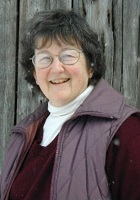Like most writers, I've done a lot of different things in my life.
I started out in science, but after 4 years of graduate school in the biology department at Harvard, having passed my Ph.D. orals, I decided I was really more interested in writing and editing than in becoming an assistant professor at some backwater college, teaching basic biology to future hair stylists, which was about all that was open to women in those days.
(It should be clear from my photo that I don't spend a lot of time with hair stylists, so for all I know they might all have an overpowering urge to learn molecular biology. If so, I apologize to them.)
Also, I'd noticed that all the real breakthroughs in science often occurred simultaneously in several different labs. I was willing to devote my life and weekends to scientific research if I thought my efforts might cure cancer or figure out how to erase unsightly wrinkles or remove belly flab. But I was not willing to make these sacrifices just to say I'd discovered the ultimate wrinkle breakthrough 10 days before some guy at another lab. Let the men fight over the credit. I was moving on.
So I quit. When I broke the news to my thesis advisor, he broke out in a big grin. "A woman has never managed to get a degree with me," he said. That was the kind of emotional support we got in those days. He offered me an MA as a consolation prize, but I turned it down. It cost an extra $10, and I was tired of giving money to Harvard.
Yes, those were the days. Things were very different then. None of the big-name professors would accept female graduate students. None of the big-name universities would appoint female professors.
"You have to understand, a woman will never get tenure at a first-rate university," I was warned when I first entered graduate school.Like a lot of the advice I received, however, this turned out to be wrong. Several years after I quit, universities were falling all over each other trying to find qualified female professors to fill their quotas.
Oh well. By this time I'd moved on to better things.
First I got a job as a live-in maid working for a well-off family on Fifth Avenue. My biggest disappointment in the job was not being able to wear a frilly apron and carry a feather duster. Also, the man of the house never chased me around the kitchen table. But I did get to buy expensive fruits and vegetables at the same market where I understood Jackie Kennedy's maid shopped. No, I never met her.
My employer enjoyed telling her friends, "My maid went to Radcliffe. Where did your maid go?" However, after 5 months I felt I'd hit the Glass Ceiling in the domestic world and began to seek another change in career.
Since then, I've worked as a lab tech in a hospital in Harlem; a mild-mannered cub reporter/editor at a small daily newspaper in Vermont; a freelance editor; an author of an allegedly humorous weekly column in a newspaper; a salesperson in a shop selling woodenware (where I made every mistake it was possible to make when using the cash register); a factory worker in a cheese factory, packing fromage blanc into little tubs and getting all the free brie cheese I could eat (which, it turned out, wasn't all that much); a hatter (only slightly mad); and a marketer of sheepskins and freezer lambs.
To me, the ideal life consists of part physical labor and part mental labor. This was one of the appeals of scientific research. Unlike those in the humanities, most working scientists don't just sit in a library thinking up clever new ideas. They get exercise carrying test tubes from hither to thither, or slogging through the outback seeking new species of worms, or other exciting things like that.
Running a farm and also having a chance to write is also very appealing to me. If I get stuck on something I'm trying to write, I can always get up and go outside and shovel some manure or stack some wood and think about the problem as I do these mindless tasks. If I begin to find the manure shoveling a tad dull, I can always go inside and work on a writing or editing project. Change is always good.
In 1996 came a big change. I was diagnosed with diabetes. This came as a big shock and required a big adjustment in my life. But, having had all that training in science, I immediately became fascinated with the science behind the disease.
I started reading about diabetes. I joined an e-mail list for people with diabetes. I haunted the Internet for information. I haunted university and hospital libraries for information. I reread books on basic biochemistry and physiology that I'd studied years before. I tried to use what I'd learned to explain diabetes to fellow patients on the e-mail lists to which I belonged.
Then one day, out of the blue, I got a telephone call from a publisher in New York who asked if I'd be interested in writing a book about diabetes. He'd gotten my name from David Mendosa, an Internet diabetes author. We chatted for a bit, I mentioned an idea I'd had about writing a book on diabetes, and the deal was made.
Thus out of adversity came a great opportunity. A friend said, "I've never known anyone who turned a disease into a career."
There are other advantages to having diabetes, I've found. I'll list some of them here to inspire others who share this disease (and also because I just learned how to make lists with HTML and I need to show off my new skills):
- I spent 30 years trying to lose 10 pounds. In the process, I managed to gain 40 pounds. Every time I'd get started on a diet, someone would invite me to a fabulous dinner and ply me with food. "Oh come on, one little bite won't hurt you. "The shock of the diagnosis was enough to get me to stick to a diet despite hunger pangs and food-plying friends. As a result, I lost 30 pounds. Still have 20 to go, but I feel a lot better without those surplus 30.
- I'm a lazy cook, and before my diabetes diagnosis I was living on white rice and garnishes, with sugary fruit yogurt for dessert (the establishment diet gurus all said carbohydrates were healthy). I'd cook a huge vat of rice and then reheat it at each meal with different garnishes: vegetables; meat; cheese; kim chee and sesame oil; or whatever I could find in the fridge.
- Now that I'm on a lowish-carb diet, I don't eat rice, so I'm forced to eat a lot of other, tastier foods: snowpeas out of season, unusual mushrooms, fresh fish, expensive mixed greens, the best cuts of lean beef, good red wine. I'm making interesting new recipes I used to be too lazy to make. I'm eating a lot less but enjoying it a lot more.
- Having diabetes gives you a good excuse not to do a lot of things you don't want to do. Gosh, I'd love go to the Rotifer Club's macaroni luncheon to hear the Grand Head Rotifer speak on "Why we should all pay more dues," but my doctor told me I shouldn't eat that kind of food.
- When you have diabetes, you're supposed to get a lot of exercise. This gives me an excuse to shop for interesting exercise equipment like snowshoes or new skis or other things I used to view as luxuries beyond my means. "It's cheaper than a Seeing-Eye dog," I say as I walk out of the store carrying my latest expensive toys.
- When you have diabetes, there's an excellent chance that you won't live to be 100. This means you can focus on enjoying life now instead of worrying about paying the nursing home bills when you're 99. Knowing your time is finite makes you focus on what's really important in life.
It constantly amazes me that I'm currently doing what I've always wanted to do. I enjoy translating complex scientific language into ordinary prose that an ordinary person can understand. And people tell me I'm good at that, which makes me happy. I can't think of anything else in my life that would be of great interest to anyone else. For those who have read this far, I have a wonderful reward. I am not, I repeat not, going to provide a link to cute pictures of my cat. Now we all have something to be grateful for.


